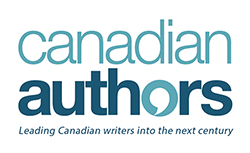Read books that highlight what it means to be BIPOC in Canada
NON-FICTION BOOKS
BlackLife
by Idil Abdillahi and Rinaldo Walcott (ARP Books)
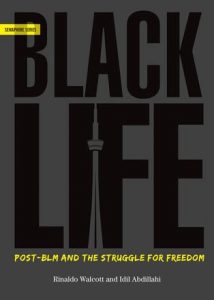 What does it mean in the era of Black Lives Matter to continue to ignore and deny the violence that is the foundation of the Canadian nation state? BlackLife discloses the ongoing destruction of Black people as enacted not simply by state structures, but beneath them in the foundational modernist ideology that underlies thinking around migration and movement, as Black erasure and death are unveiled as horrifically acceptable throughout western culture. With exactitude and celerity, Idil Abdillahi and Rinaldo Walcott pull from local history, literature, theory, music, and public policy around everything from arts funding, to crime and mental health–presenting a convincing call to challenge pervasive thought on dominant culture’s conception of Black personhood.
What does it mean in the era of Black Lives Matter to continue to ignore and deny the violence that is the foundation of the Canadian nation state? BlackLife discloses the ongoing destruction of Black people as enacted not simply by state structures, but beneath them in the foundational modernist ideology that underlies thinking around migration and movement, as Black erasure and death are unveiled as horrifically acceptable throughout western culture. With exactitude and celerity, Idil Abdillahi and Rinaldo Walcott pull from local history, literature, theory, music, and public policy around everything from arts funding, to crime and mental health–presenting a convincing call to challenge pervasive thought on dominant culture’s conception of Black personhood.
Angry Queer Somali Boy
by Mohamed Abdulkarim Ali (University of Regina Press)
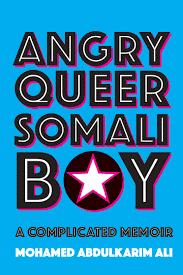 Kidnapped by his father on the eve of Somalia’s societal implosion, Mohamed Ali was taken first to the Netherlands by his stepmother, and then later on to Canada.
Kidnapped by his father on the eve of Somalia’s societal implosion, Mohamed Ali was taken first to the Netherlands by his stepmother, and then later on to Canada.
Unmoored from his birth family and caught between twin alienating forces of Somali tradition and Western culture, Mohamed must forge his own queer coming of age.
What follows in this fierce and unrelenting account is a story of one young man’s nascent sexuality fused with the violence wrought by displacement.
I’ve Been Meaning to Tell You
by David Chariandy (Bloomsbury Publishing)
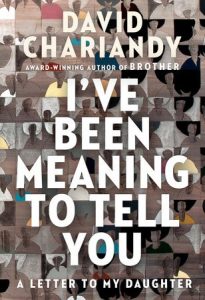 When a moment of quietly ignored bigotry prompted his three-year-old daughter to ask “what happened?” David Chariandy began wondering how to discuss with his children the politics of race. A decade later, in a newly heated era of both struggle and divisions, he writes a letter to his now thirteen-year-old daughter. David is the son of Black and South Asian migrants from Trinidad, and he draws upon his personal and ancestral past, including the legacies of slavery, indenture, and immigration, as well as the experiences of growing up a visible minority within the land of one’s birth.
When a moment of quietly ignored bigotry prompted his three-year-old daughter to ask “what happened?” David Chariandy began wondering how to discuss with his children the politics of race. A decade later, in a newly heated era of both struggle and divisions, he writes a letter to his now thirteen-year-old daughter. David is the son of Black and South Asian migrants from Trinidad, and he draws upon his personal and ancestral past, including the legacies of slavery, indenture, and immigration, as well as the experiences of growing up a visible minority within the land of one’s birth.
In sharing with his daughter his own story, he hopes to help cultivate within her a sense of identity and responsibility that balances the painful truths of the past and present with hopeful possibilities for the future.
‘Membering
by Austin Clarke (Dundurn)
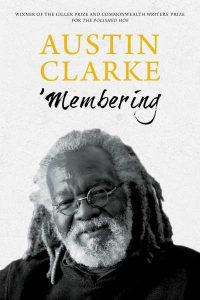 The unforgettable memoir of Giller Prize–winning author and poet Austin Clarke, called “Canada’s first multicultural writer.” In ’Membering, Clarke shares his own experiences growing up in Barbados and moving to Toronto to attend university in 1955 before becoming a journalist. With vivid realism he describes Harlem of the ’60s, meeting and interviewing Malcolm X and writers Chinua Achebe and LeRoi Jones. Clarke went on to become a pioneering instructor of Afro-American Literature at Yale University and inspired a new generation of Afro-American writers. Here he eschews a traditional chronological order of events and takes the reader on a lyrical tour of his extraordinary life, interspersed with thought-provoking meditations on politics and race. Telling things as he ’members them.
The unforgettable memoir of Giller Prize–winning author and poet Austin Clarke, called “Canada’s first multicultural writer.” In ’Membering, Clarke shares his own experiences growing up in Barbados and moving to Toronto to attend university in 1955 before becoming a journalist. With vivid realism he describes Harlem of the ’60s, meeting and interviewing Malcolm X and writers Chinua Achebe and LeRoi Jones. Clarke went on to become a pioneering instructor of Afro-American Literature at Yale University and inspired a new generation of Afro-American writers. Here he eschews a traditional chronological order of events and takes the reader on a lyrical tour of his extraordinary life, interspersed with thought-provoking meditations on politics and race. Telling things as he ’members them.
The Skin We’re In: A Year of Black Resistance and Power
by Desmond Cole (Penguin Random House Canada)
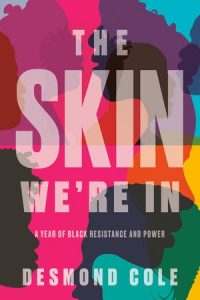 A bracing, provocative, and perspective-shifting book from one of Canada’s most celebrated and uncompromising writers. Desmond Cole exposed the racist actions of the Toronto police force, detailing the dozens of times he had been stopped and interrogated under the controversial practice of carding. The story quickly came to national prominence, shaking the country to its core and catapulting its author into the public sphere. Cole used his newfound profile to draw insistent, unyielding attention to the injustices faced by Black Canadians on a daily basis. Both Cole’s activism and journalism find vibrant expression in his first book, The Skin We’re In. Puncturing the bubble of Canadian smugness and naive assumptions of a post-racial nation, Cole chronicles just one year—2017—in the struggle against racism in this country. Month-by-month, Cole creates a comprehensive picture of entrenched, systemic inequality.
A bracing, provocative, and perspective-shifting book from one of Canada’s most celebrated and uncompromising writers. Desmond Cole exposed the racist actions of the Toronto police force, detailing the dozens of times he had been stopped and interrogated under the controversial practice of carding. The story quickly came to national prominence, shaking the country to its core and catapulting its author into the public sphere. Cole used his newfound profile to draw insistent, unyielding attention to the injustices faced by Black Canadians on a daily basis. Both Cole’s activism and journalism find vibrant expression in his first book, The Skin We’re In. Puncturing the bubble of Canadian smugness and naive assumptions of a post-racial nation, Cole chronicles just one year—2017—in the struggle against racism in this country. Month-by-month, Cole creates a comprehensive picture of entrenched, systemic inequality.
The Hanging of Angélique: The Untold Story of Canadian Slavery and the Burning of Old Montreal
by Afua Cooper (HarperCollinsCanada)
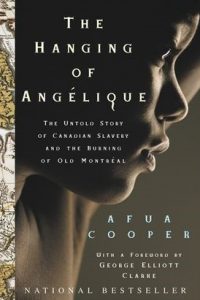 Writer, historian and poet Afua Cooper tells the astonishing story of Marie-Joseph Angélique, a slave woman convicted of starting a fire that destroyed a large part of Montréal in April 1734 and condemned to die a brutal death. In a powerful retelling of Angélique’s story—now supported by archival illustrations— Cooper builds on 15 years of research to shed new light on a rebellious Portuguese-born black woman who refused to accept her indentured servitude. At the same time, Cooper completely demolishes the myth of a benign, slave-free Canada, revealing a damning 200-year-old record of legally and culturally endorsed slavery.
Writer, historian and poet Afua Cooper tells the astonishing story of Marie-Joseph Angélique, a slave woman convicted of starting a fire that destroyed a large part of Montréal in April 1734 and condemned to die a brutal death. In a powerful retelling of Angélique’s story—now supported by archival illustrations— Cooper builds on 15 years of research to shed new light on a rebellious Portuguese-born black woman who refused to accept her indentured servitude. At the same time, Cooper completely demolishes the myth of a benign, slave-free Canada, revealing a damning 200-year-old record of legally and culturally endorsed slavery.
A Mind Spread Out on the Ground </strong >by Alicia Elliott (Anchor Canada)
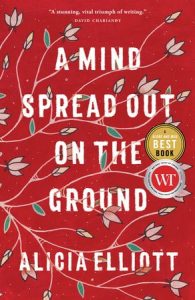 A bold and profound meditation on trauma, legacy, oppression, and racism in North America from award-winning Haudenosaunee writer Alicia Elliott. In an urgent and visceral work that asks essential questions about the treatment of Native people in North America while drawing on intimate details of her own life and experience with intergenerational trauma, Alicia Elliott offers indispensable insight into the ongoing legacy of colonialism. She engages with such wide-ranging topics as race, parenthood, love, mental illness, poverty, sexual assault, gentrifcation, writing and representation, and in the process makes connections both large and small between the past and present, the personal and political—from overcoming a years-long battle with head lice to the way Native writers are treated within the Canadian literary industry; her unplanned teenage pregnancy to the history of dark matter and how it relates to racism in the court system; her childhood diet of Kraft Dinner to how systemic oppression is directly linked to health problems in Native communities.
A bold and profound meditation on trauma, legacy, oppression, and racism in North America from award-winning Haudenosaunee writer Alicia Elliott. In an urgent and visceral work that asks essential questions about the treatment of Native people in North America while drawing on intimate details of her own life and experience with intergenerational trauma, Alicia Elliott offers indispensable insight into the ongoing legacy of colonialism. She engages with such wide-ranging topics as race, parenthood, love, mental illness, poverty, sexual assault, gentrifcation, writing and representation, and in the process makes connections both large and small between the past and present, the personal and political—from overcoming a years-long battle with head lice to the way Native writers are treated within the Canadian literary industry; her unplanned teenage pregnancy to the history of dark matter and how it relates to racism in the court system; her childhood diet of Kraft Dinner to how systemic oppression is directly linked to health problems in Native communities.
They Call Me George: The Untold Story of Black Train Porters and the Birth of Modern Canada
by Cecil Foster (Biblioasis)
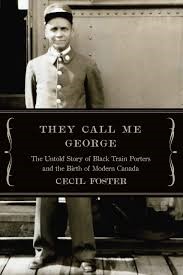 Smartly dressed and smiling, Canada’s black train porters were a familiar sight to the average passenger—yet their minority status rendered them politically invisible, second-class in the social imagination that determined who was and who was not considered Canadian. Subjected to grueling shifts and unreasonable standards—a passenger missing his stop was a dismissible offense—the so-called Pullmen of the country’s rail lines were denied secure positions and prohibited from bringing their families to Canada, and it was their struggle against the racist Dominion that laid the groundwork for the multicultural nation we know today. Drawing on the experiences of these influential black Canadians, Cecil Foster’s They Call Me George demonstrates the power of individuals and minority groups in the fight for social justice and shows how a country can change for the better.
Smartly dressed and smiling, Canada’s black train porters were a familiar sight to the average passenger—yet their minority status rendered them politically invisible, second-class in the social imagination that determined who was and who was not considered Canadian. Subjected to grueling shifts and unreasonable standards—a passenger missing his stop was a dismissible offense—the so-called Pullmen of the country’s rail lines were denied secure positions and prohibited from bringing their families to Canada, and it was their struggle against the racist Dominion that laid the groundwork for the multicultural nation we know today. Drawing on the experiences of these influential black Canadians, Cecil Foster’s They Call Me George demonstrates the power of individuals and minority groups in the fight for social justice and shows how a country can change for the better.
Peace and Good Order: The Case for Indigenous Justice in Canada
by Harold R. Johnson (Penguin Random House Canada)
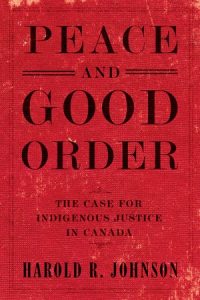 An urgent, informed, intimate condemnation of the Canadian state and its failure to deliver justice to Indigenous people by national bestselling author and former Crown prosecutor Harold R. Johnson. In early 2018, the failures of Canada’s justice system were sharply and painfully revealed in the verdicts issued in the deaths of Colten Boushie and Tina Fontaine. The outrage and confusion that followed those verdicts inspired former Crown prosecutor and bestselling author Harold R. Johnson to make the case against Canada for its failure to fulfill its duty under Treaty to effectively deliver justice to Indigenous people, worsening the situation and ensuring long-term damage to Indigenous communities. In this direct, concise, and essential volume, Harold R. Johnson examines the justice system’s failures to deliver “peace and good order” to Indigenous people.
An urgent, informed, intimate condemnation of the Canadian state and its failure to deliver justice to Indigenous people by national bestselling author and former Crown prosecutor Harold R. Johnson. In early 2018, the failures of Canada’s justice system were sharply and painfully revealed in the verdicts issued in the deaths of Colten Boushie and Tina Fontaine. The outrage and confusion that followed those verdicts inspired former Crown prosecutor and bestselling author Harold R. Johnson to make the case against Canada for its failure to fulfill its duty under Treaty to effectively deliver justice to Indigenous people, worsening the situation and ensuring long-term damage to Indigenous communities. In this direct, concise, and essential volume, Harold R. Johnson examines the justice system’s failures to deliver “peace and good order” to Indigenous people.
In My Own Moccasins
by Helen Knott (University of Regina Press)
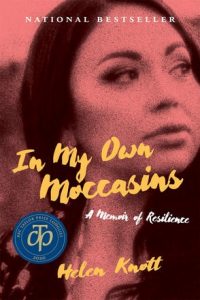 A nationally bestselling book on the struggle of addiction and the power of Indigenous resilience. Helen Knott, a highly accomplished Indigenous woman, seems to have it all. But in her memoir, she offers a different perspective. In My Own Moccasins is an unflinching account of addiction, intergenerational trauma, and the wounds brought on by sexual violence. It is also the story of sisterhood, the power of ceremony, the love of family, and the possibility of redemption.
A nationally bestselling book on the struggle of addiction and the power of Indigenous resilience. Helen Knott, a highly accomplished Indigenous woman, seems to have it all. But in her memoir, she offers a different perspective. In My Own Moccasins is an unflinching account of addiction, intergenerational trauma, and the wounds brought on by sexual violence. It is also the story of sisterhood, the power of ceremony, the love of family, and the possibility of redemption.
With gripping moments of withdrawal, times of spiritual awareness, and historical insights going back to the signing of Treaty 8 by her great-great grandfather, Chief Bigfoot, her journey exposes the legacy of colonialism, while reclaiming her spirit.
Heart Berries
by Terese Marie Mailhot (Counterpoint Press)
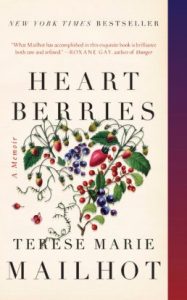 Heart Berries is a powerful, poetic memoir of a woman’s coming of age on the Seabird Island Band in the Pacific Northwest. Having survived a profoundly dysfunctional upbringing only to find herself hospitalized and facing a dual diagnosis of post traumatic stress disorder and bipolar II disorder; Terese Marie Mailhot is given a notebook and begins to write her way out of trauma. The triumphant result is Heart Berries, a memorial for Mailhot’s mother, a social worker and activist who had a thing for prisoners; a story of reconciliation with her father—an abusive drunk and a brilliant artist–who was murdered under mysterious circumstances; and an elegy on how difficult it is to love someone while dragging the long shadows of shame.
Heart Berries is a powerful, poetic memoir of a woman’s coming of age on the Seabird Island Band in the Pacific Northwest. Having survived a profoundly dysfunctional upbringing only to find herself hospitalized and facing a dual diagnosis of post traumatic stress disorder and bipolar II disorder; Terese Marie Mailhot is given a notebook and begins to write her way out of trauma. The triumphant result is Heart Berries, a memorial for Mailhot’s mother, a social worker and activist who had a thing for prisoners; a story of reconciliation with her father—an abusive drunk and a brilliant artist–who was murdered under mysterious circumstances; and an elegy on how difficult it is to love someone while dragging the long shadows of shame.
They Said This Would Be Fun
by Eternity Martis (Penguin Random House Canada)
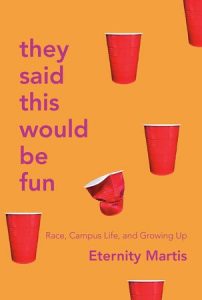 A powerful, moving memoir about what it’s like to be a student of colour on a predominantly white campus. A booksmart kid from Toronto, Eternity Martis was excited to move away to Western University for her undergraduate degree. But as one of the few Black students there, she soon discovered that the campus experiences she’d seen in movies were far more complex in reality. Over the next four years, Eternity learned more about what someone like her brought out in other people than she did about herself. She was confronted by white students in blackface at parties, dealt with being the only person of colour in class and was tokenized by her romantic partners. She heard racial slurs in bars, on the street, and during lectures. And she gathered labels she never asked for: Abuse survivor. Token. Bad feminist. But, by graduation, she found an unshakeable sense of self—and a support network of other women of colour. Using her award-winning reporting skills, Eternity connects her own experience to the systemic issues plaguing students today.
A powerful, moving memoir about what it’s like to be a student of colour on a predominantly white campus. A booksmart kid from Toronto, Eternity Martis was excited to move away to Western University for her undergraduate degree. But as one of the few Black students there, she soon discovered that the campus experiences she’d seen in movies were far more complex in reality. Over the next four years, Eternity learned more about what someone like her brought out in other people than she did about herself. She was confronted by white students in blackface at parties, dealt with being the only person of colour in class and was tokenized by her romantic partners. She heard racial slurs in bars, on the street, and during lectures. And she gathered labels she never asked for: Abuse survivor. Token. Bad feminist. But, by graduation, she found an unshakeable sense of self—and a support network of other women of colour. Using her award-winning reporting skills, Eternity connects her own experience to the systemic issues plaguing students today.
North of the Color Line: Migration and Black Resistance in Canada, 1870-1955
by Sarah-Jane Mathieu (The University of North Carolina Press)
North of the C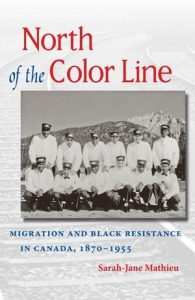 olor Line examines life in Canada for the estimated 5,000 blacks, both African Americans and West Indians, who immigrated to Canada after the end of Reconstruction in the United States. Through the experiences of black railway workers and their union, the Order of Sleeping Car Porters, Sarah-Jane Mathieu connects social, political, labor, immigration, and black diaspora history during the Jim Crow era. Using the firsthand accounts of former sleeping car porters, Mathieu shows that porters often found themselves leading racial uplift organizations, galvanizing their communities, and becoming the bedrock of civil rights activism. Examining the spread of segregation laws and practices in Canada, whose citizens often imagined themselves as devoid of racism, Mathieu historicizes Canadian racial attitudes, and explores how black migrants brought their own sensibilities about race to Canada, participating in and changing political discourse there.
olor Line examines life in Canada for the estimated 5,000 blacks, both African Americans and West Indians, who immigrated to Canada after the end of Reconstruction in the United States. Through the experiences of black railway workers and their union, the Order of Sleeping Car Porters, Sarah-Jane Mathieu connects social, political, labor, immigration, and black diaspora history during the Jim Crow era. Using the firsthand accounts of former sleeping car porters, Mathieu shows that porters often found themselves leading racial uplift organizations, galvanizing their communities, and becoming the bedrock of civil rights activism. Examining the spread of segregation laws and practices in Canada, whose citizens often imagined themselves as devoid of racism, Mathieu historicizes Canadian racial attitudes, and explores how black migrants brought their own sensibilities about race to Canada, participating in and changing political discourse there.
Policing Black Lives: State Violence in Canada from Slavery to the Present
by Robyn Maynard (Fernwood Publishing)
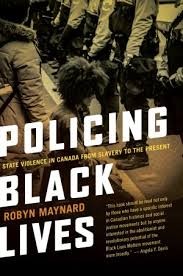 Delving behind Canada’s veneer of multiculturalism and tolerance, Policing Black Lives traces the violent realities of anti-blackness from the slave ships to prisons, classrooms and beyond. Robyn Maynard provides readers with the first comprehensive account of nearly four hundred years of state-sanctioned surveillance, criminalization, and punishment of Black lives in Canada.
Delving behind Canada’s veneer of multiculturalism and tolerance, Policing Black Lives traces the violent realities of anti-blackness from the slave ships to prisons, classrooms and beyond. Robyn Maynard provides readers with the first comprehensive account of nearly four hundred years of state-sanctioned surveillance, criminalization, and punishment of Black lives in Canada.
Emerging from a critical race feminist framework that insists that all Black lives matter, Maynard’s intersectional approach to anti-Black racism addresses the unique and understudied impacts of state violence as it is experienced by Black women, Black people with disabilities, as well as queer, trans, and undocumented Black communities. A call-to-action, Policing Black Lives urges readers to work toward dismantling structures of racial domination and re-imagining a more just society.
Mamaskatch
by Darrel J. McLeod (Douglas & McIntyre)
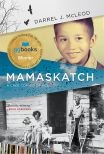 Growing up in the tiny village of Smith, Alberta, Darrel J. McLeod was surrounded by his Cree family’s history. In shifting and unpredictable stories, his mother, Bertha, shared narratives of their culture, their family and the cruelty that she and her sisters endured in residential school. Bertha taught him to be fiercely proud of his heritage and to listen to the birds that would return to watch over and guide him at key junctures of his life. However, in a spiral of events, Darrel’s mother turned wild and unstable, and their home life became chaotic. The fractured narrative of Mamaskatch mirrors Bertha’s attempts to reckon with the trauma and abuse she faced in her own life, and captures an intensely moving portrait of a family of strong personalities, deep ties and the shared history that both binds and haunts them. Beautifully written, honest and thought-provoking, Mamaskatch—named for the Cree word used as a response to dreams shared—is ultimately an uplifting account of overcoming personal and societal obstacles.
Growing up in the tiny village of Smith, Alberta, Darrel J. McLeod was surrounded by his Cree family’s history. In shifting and unpredictable stories, his mother, Bertha, shared narratives of their culture, their family and the cruelty that she and her sisters endured in residential school. Bertha taught him to be fiercely proud of his heritage and to listen to the birds that would return to watch over and guide him at key junctures of his life. However, in a spiral of events, Darrel’s mother turned wild and unstable, and their home life became chaotic. The fractured narrative of Mamaskatch mirrors Bertha’s attempts to reckon with the trauma and abuse she faced in her own life, and captures an intensely moving portrait of a family of strong personalities, deep ties and the shared history that both binds and haunts them. Beautifully written, honest and thought-provoking, Mamaskatch—named for the Cree word used as a response to dreams shared—is ultimately an uplifting account of overcoming personal and societal obstacles.
Shame on Me: An Anatomy of Race and Belonging
by Tessa McWatt (Scribe)
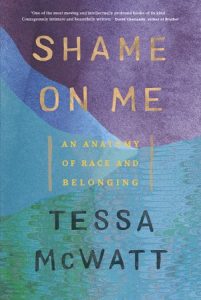 Interrogating our ideas of race through the lens of her own multi-racial identity, critically acclaimed novelist Tessa McWatt turns her eye on herself, her body, and this world in a powerful new work of non-fiction.
Interrogating our ideas of race through the lens of her own multi-racial identity, critically acclaimed novelist Tessa McWatt turns her eye on herself, her body, and this world in a powerful new work of non-fiction.
Tessa McWatt has been called Susie Wong, Pocahontas and “black bitch,” and has been judged not black enough by people who assume she straightens her hair. Now, through a close examination of her own body—nose, lips, hair, skin, eyes, ass, bones and blood—which holds up a mirror to the way culture reads all bodies, she asks why we persist in thinking in terms of race today when racism is killing us. Shame on Me is a personal and powerful exploration of history and identity, colour, and desire from a writer who, having been plagued with confusion about her race all her life, has at last found kinship and solidarity in story.
Blank: Essays and Interviews
by M. NourbeSe Philip (Book*hug Press)
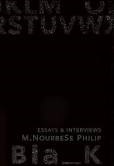 Blank is a collection of previously out-of-print essays and new works by one of Canada’s most important contemporary writers and thinkers. Through an engagement with her earlier work, M. NourbeSe Philip comes to realize the existence of a repetition in the world: the return of something that, while still present, has become unembedded from the world, disappeared. Her imperative becomes to make us see what has gone unseen, by writing memory upon the margin of history, in the shadow of empire and at the frontier of silence. In heretical writings that work to make the disappeared perceptible, Blank explores questions of race, the body politic, timeliness, recurrence, ongoingness, art, and the so-called multicultural nation. Through these considerations, Philip creates a linguistic form that registers the presence of what has seemingly dissolved, a form that also imprints the loss and the silence surrounding those disappearances in its very presence.
Blank is a collection of previously out-of-print essays and new works by one of Canada’s most important contemporary writers and thinkers. Through an engagement with her earlier work, M. NourbeSe Philip comes to realize the existence of a repetition in the world: the return of something that, while still present, has become unembedded from the world, disappeared. Her imperative becomes to make us see what has gone unseen, by writing memory upon the margin of history, in the shadow of empire and at the frontier of silence. In heretical writings that work to make the disappeared perceptible, Blank explores questions of race, the body politic, timeliness, recurrence, ongoingness, art, and the so-called multicultural nation. Through these considerations, Philip creates a linguistic form that registers the presence of what has seemingly dissolved, a form that also imprints the loss and the silence surrounding those disappearances in its very presence.
Queer Returns: Essays on Multiculturalism, Diaspora, and Black Studies
by Rinaldo Walcott (Insomniac Press)
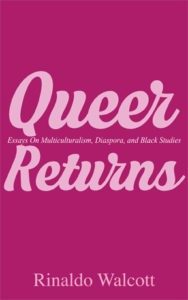 Queer Returns returns us to the scene of multiculturalism, diaspora, and queer through the lens of Black expression, identity, and the political. The essays question what it means to live in a multicultural society, how diaspora impacts identity and culture, and how the categories of queer and Black and Black queer complicate the political claims of multiculturalism, diaspora, and queer politics.
Queer Returns returns us to the scene of multiculturalism, diaspora, and queer through the lens of Black expression, identity, and the political. The essays question what it means to live in a multicultural society, how diaspora impacts identity and culture, and how the categories of queer and Black and Black queer complicate the political claims of multiculturalism, diaspora, and queer politics.
Until We Are Free: Reflections on Black Lives Matter in Canada
edited by Rodney Diverlus, Sandy Hudson and Syrus Marcus Ware (University of Regina Press)
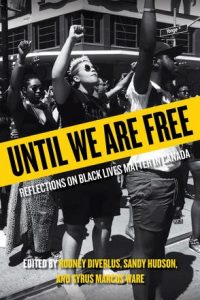 The killing of Trayvon Martin in 2012 by a white assailant inspired the Black Lives Matter movement, which quickly spread outside the borders of the United States. The movement’s message found fertile ground in Canada, where Black activists speak of generations of injustice and continue the work of the Black liberators who have come before them. Until We Are Free contains some of the very best writing on the hottest issues facing the Black community in Canada. It describes the latest developments in Canadian Black activism, organizing efforts through the use of social media, Black-Indigenous alliances, and more.
The killing of Trayvon Martin in 2012 by a white assailant inspired the Black Lives Matter movement, which quickly spread outside the borders of the United States. The movement’s message found fertile ground in Canada, where Black activists speak of generations of injustice and continue the work of the Black liberators who have come before them. Until We Are Free contains some of the very best writing on the hottest issues facing the Black community in Canada. It describes the latest developments in Canadian Black activism, organizing efforts through the use of social media, Black-Indigenous alliances, and more.
Black Writers Matter
edited by Whitney French (University of Regina Press)
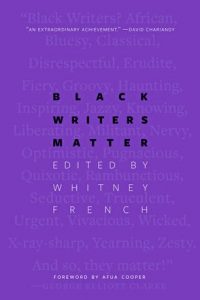 An anthology of African-Canadian writing, Black Writers Matter offers a cross-section of established writers and newcomers to the literary world who tackle contemporary and pressing issues with beautiful, sometimes raw, prose. As editor Whitney French says in her introduction, Black Writers Matter “injects new meaning into the word diversity [and] harbours a sacredness and an everydayness that offers Black people dignity. ” An “invitation to read, share, and tell stories of Black narratives that are close to the bone,” this collection feels particular to the Black Canadian experience.
An anthology of African-Canadian writing, Black Writers Matter offers a cross-section of established writers and newcomers to the literary world who tackle contemporary and pressing issues with beautiful, sometimes raw, prose. As editor Whitney French says in her introduction, Black Writers Matter “injects new meaning into the word diversity [and] harbours a sacredness and an everydayness that offers Black people dignity. ” An “invitation to read, share, and tell stories of Black narratives that are close to the bone,” this collection feels particular to the Black Canadian experience.
FICTION BOOKS
The Red Chesterfield
by Wayne Arthurson (University of Calgary Press)
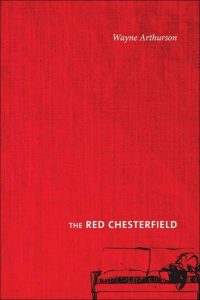 M is a bylaw officer, living with two brothers, in their parents’ old house. While investigating a suspicious yard sale, M discovers a red chesterfield sitting in a ditch. Looking closer, M finds a running shoe—and a severed foot.
M is a bylaw officer, living with two brothers, in their parents’ old house. While investigating a suspicious yard sale, M discovers a red chesterfield sitting in a ditch. Looking closer, M finds a running shoe—and a severed foot.
Now M is involved in a murder investigation. Meanwhile, older brother K’s work for a new political party begins to seem suspicious, while younger brother J navigates the complicated world of young-adulthood, and boss Rhonda demands more and more attention, M must navigate a world of Russian gangsters and neglected wives, biker gangs and suspicious coincidences. On top of everything else, M is determined to track down the owner of that red chesterfield and make sure they get a ticket. The Red Chesterfield is a delightful, unusual novella that upends the tropes and traditions of crime fiction while asking how far one person is willing to go to solve a crime, be it murder or the abandonment of a piece of furniture. Wayne Arthurson is a writer of Cree and French-Canadian descent.
Empire of Wild
by Cherie Dimaline (Penguin Random House Canada)
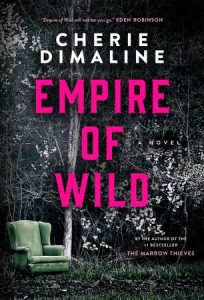 Broken-hearted Joan has been searching for her husband, Victor, for almost a year—ever since he went missing on the night they had their first serious argument. One hung-over morning in a Walmart parking lot in a little town near Georgian Bay, she is drawn to a revival tent where the local Métis have been flocking to hear a charismatic preacher. By the time she staggers into the tent the service is over, but as she is about to leave, she hears an unmistakable voice. She turns, and there is Victor. Only he insists he is not Victor, but the Reverend Eugene Wolff, on a mission to bring his people to Jesus. And he doesn’t seem to be faking; there isn’t even a flicker of recognition in his eyes. With only two allies—her odd, Johnny-Cash-loving, 12-year-old nephew Zeus, and Ajean, a foul-mouthed euchre shark with deep knowledge of the old ways—Joan sets out to remind the Reverend Wolff of who he really is. If he really is Victor, his life, and the life of everyone she loves, depends upon her success. Inspired by the traditional Métis story of the Rogarou—a werewolf-like creature that haunts the roads and woods of Métis communities—Cherie Dimaline has created a propulsive, stunning and sensuous novel.
Broken-hearted Joan has been searching for her husband, Victor, for almost a year—ever since he went missing on the night they had their first serious argument. One hung-over morning in a Walmart parking lot in a little town near Georgian Bay, she is drawn to a revival tent where the local Métis have been flocking to hear a charismatic preacher. By the time she staggers into the tent the service is over, but as she is about to leave, she hears an unmistakable voice. She turns, and there is Victor. Only he insists he is not Victor, but the Reverend Eugene Wolff, on a mission to bring his people to Jesus. And he doesn’t seem to be faking; there isn’t even a flicker of recognition in his eyes. With only two allies—her odd, Johnny-Cash-loving, 12-year-old nephew Zeus, and Ajean, a foul-mouthed euchre shark with deep knowledge of the old ways—Joan sets out to remind the Reverend Wolff of who he really is. If he really is Victor, his life, and the life of everyone she loves, depends upon her success. Inspired by the traditional Métis story of the Rogarou—a werewolf-like creature that haunts the roads and woods of Métis communities—Cherie Dimaline has created a propulsive, stunning and sensuous novel.
Half-Blood Blues
by Esi Edugyan (HarperCollins Canada)
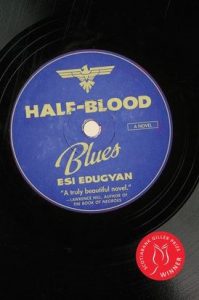 Esi Edugyan’s Half-Blood Blues took the literary world by storm when it was first published, captivating readers and reviewers with its audacity, power, and sheer brilliance. The novel won or was nominated for every literary prize in Canada—and many international ones, too, including the prestigious Man Booker Prize.
Esi Edugyan’s Half-Blood Blues took the literary world by storm when it was first published, captivating readers and reviewers with its audacity, power, and sheer brilliance. The novel won or was nominated for every literary prize in Canada—and many international ones, too, including the prestigious Man Booker Prize.
From the smoky bars of pre-war Berlin to the salons of Paris, the narrator of Half-Blood Blues, musician Sid Griffiths, leads the reader through a fascinating, little-known world and into the heart of his own guilty conscience. The bestselling, award-winning Half-Blood Blues is an entrancing, electric story about jazz, race, love and loyalty, and the sacrifices we ask of ourselves—and demand of others—in the name of art.
Bone Black
by Carol Rose GoldenEagle (Harbour Publishing)
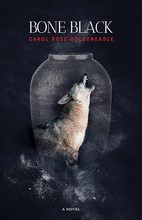 There are too many stories about Indigenous women who go missing or are murdered, and it doesn’t seem as though official sources such as government, police or the courts respond in a way that works toward finding justice or even solutions. At least that is the way Wren StrongEagle sees it. Wren is devastated when her twin sister, Raven, mysteriously disappears after the two spend an evening visiting at a local pub. When Wren files a missing persons report with the local police, she is dismissed and becomes convinced the case will not be properly investigated. As she follows media reports, Wren realizes that the same heartbreak she’s feeling is the same for too many families, indeed for whole Nations. Something within Wren snaps and she decides to take justice into her own hands. She soon disappears into a darkness, struggling to come to terms with the type of justice she delivers. Throughout her choices, and every step along the way, Wren feels as though she is being guided. But, by what?
There are too many stories about Indigenous women who go missing or are murdered, and it doesn’t seem as though official sources such as government, police or the courts respond in a way that works toward finding justice or even solutions. At least that is the way Wren StrongEagle sees it. Wren is devastated when her twin sister, Raven, mysteriously disappears after the two spend an evening visiting at a local pub. When Wren files a missing persons report with the local police, she is dismissed and becomes convinced the case will not be properly investigated. As she follows media reports, Wren realizes that the same heartbreak she’s feeling is the same for too many families, indeed for whole Nations. Something within Wren snaps and she decides to take justice into her own hands. She soon disappears into a darkness, struggling to come to terms with the type of justice she delivers. Throughout her choices, and every step along the way, Wren feels as though she is being guided. But, by what?
Five Little Indians
by Michelle Good (HarperCollins Canada)
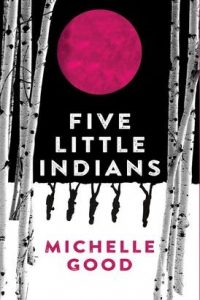 Taken from their families when they are very small and sent to a remote, church-run residential school, Kenny, Lucy, Clara, Howie and Maisie are barely out of childhood when they are finally released after years of detention. Alone and without any skills, support or families, the teens find their way to the seedy and foreign world of Downtown Eastside Vancouver, where they cling together, striving to find a place of safety and belonging in a world that doesn’t want them.
Taken from their families when they are very small and sent to a remote, church-run residential school, Kenny, Lucy, Clara, Howie and Maisie are barely out of childhood when they are finally released after years of detention. Alone and without any skills, support or families, the teens find their way to the seedy and foreign world of Downtown Eastside Vancouver, where they cling together, striving to find a place of safety and belonging in a world that doesn’t want them.
The paths of the five friends cross and crisscross over the decades as they struggle to overcome, or at least forget, the trauma they endured during their years at the Mission. With compassion and insight, Five Little Indians chronicles the desperate quest of these residential school survivors to come to terms with their past and, ultimately, find a way forward.
Emancipation Day
by Wayne Grady (Penguin Random House Canada)
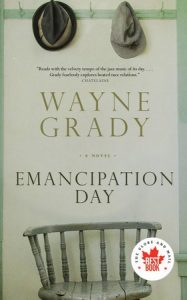 With his curly black hair and his wicked grin, everyone swoons and thinks of Frank Sinatra when Navy musician Jackson Lewis takes the stage. It’s World War II, and while stationed in St. John’s, Newfoundland, Jack meets the well-heeled Vivian Clift, a local girl who has never stepped off the Rock and longs to see the world. They marry against Vivian’s family’s wishes–there’s something about Jack that they just don’t like–and as the war draws to a close, the couple travels to Windsor to meet Jack’s family. But when Vivian meets Jack’s mother and brother, everything she thought she knew about her husband gets called into question. They don’t live in the dream home Jack depicted, they all look different from one another–different from anyone Vivian has ever seen–and after weeks of waiting to meet Jack’s father, he never materializes. Steeped in jazz and big-band music, spanning pre- and post-war Windsor-Detroit, St. John’s, Newfoundland, and 1950s Toronto, this is an arresting, heartwrenching novel about fathers and sons, love and sacrifice, race relations and a time in our history when the world was on the cusp of momentous change.
With his curly black hair and his wicked grin, everyone swoons and thinks of Frank Sinatra when Navy musician Jackson Lewis takes the stage. It’s World War II, and while stationed in St. John’s, Newfoundland, Jack meets the well-heeled Vivian Clift, a local girl who has never stepped off the Rock and longs to see the world. They marry against Vivian’s family’s wishes–there’s something about Jack that they just don’t like–and as the war draws to a close, the couple travels to Windsor to meet Jack’s family. But when Vivian meets Jack’s mother and brother, everything she thought she knew about her husband gets called into question. They don’t live in the dream home Jack depicted, they all look different from one another–different from anyone Vivian has ever seen–and after weeks of waiting to meet Jack’s father, he never materializes. Steeped in jazz and big-band music, spanning pre- and post-war Windsor-Detroit, St. John’s, Newfoundland, and 1950s Toronto, this is an arresting, heartwrenching novel about fathers and sons, love and sacrifice, race relations and a time in our history when the world was on the cusp of momentous change.
Any Known Blood
by Lawrence Hill (HarperCollins Canada)
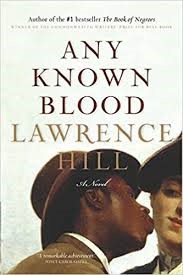 Spanning five generations, sweeping across a century and a half of almost unknown history, this acclaimed and unexpectedly funny novel is the story of a man seeking himself in the mirror of his family’s past. Rich in historical detail and gracefully flowing from the slave trade of nineteenth-century Virginia to the present, Any Known Blood gives life to a story never before told, a story of five generations of a black Canadian family whose tragedies and victories merge with the American experience.
Spanning five generations, sweeping across a century and a half of almost unknown history, this acclaimed and unexpectedly funny novel is the story of a man seeking himself in the mirror of his family’s past. Rich in historical detail and gracefully flowing from the slave trade of nineteenth-century Virginia to the present, Any Known Blood gives life to a story never before told, a story of five generations of a black Canadian family whose tragedies and victories merge with the American experience.
Things Are Good Now
by Djamila Ibrahim (House of Anansi Press)
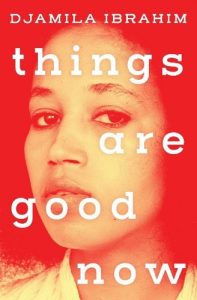 Set in East Africa, the Middle East, Canada, and the U.S., Things Are Good Now examines the weight of the migrant experience on the human psyche. In these pages, women, men, and children who’ve crossed continents in search of a better life find themselves struggling with the chaos of displacement and the religious and cultural clashes they face in their new homes. A maid who travelled to the Middle East lured by the prospect of a well-paying job is trapped in the Syrian war. A female ex-freedom fighter immigrates to Canada only to be relegated to cleaning public washrooms and hospital sheets. A disillusioned civil servant struggles to come to grips with his lover’s imminent departure. A young Muslim Canadian woman who’d married her way to California to escape her devout family’s demands realizes she’s made a mistake. The collection is about remorse and the power of memory, about the hardships of a post-9/11 reality that labels many as suspicious or dangerous because of their names or skin colour alone, but it’s also about hope and friendship and the intricacies of human relationships. Most importantly, it’s about the compromises we make to belong.
Set in East Africa, the Middle East, Canada, and the U.S., Things Are Good Now examines the weight of the migrant experience on the human psyche. In these pages, women, men, and children who’ve crossed continents in search of a better life find themselves struggling with the chaos of displacement and the religious and cultural clashes they face in their new homes. A maid who travelled to the Middle East lured by the prospect of a well-paying job is trapped in the Syrian war. A female ex-freedom fighter immigrates to Canada only to be relegated to cleaning public washrooms and hospital sheets. A disillusioned civil servant struggles to come to grips with his lover’s imminent departure. A young Muslim Canadian woman who’d married her way to California to escape her devout family’s demands realizes she’s made a mistake. The collection is about remorse and the power of memory, about the hardships of a post-9/11 reality that labels many as suspicious or dangerous because of their names or skin colour alone, but it’s also about hope and friendship and the intricacies of human relationships. Most importantly, it’s about the compromises we make to belong.
Crow Winter
by Karen McBride (Harper Collins Canada)
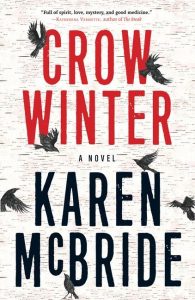 Nanabush. A name that has a certain weight on the tongue—a taste. Like lit sage in a windowless room or aluminum foil on a metal filling. Trickster. Storyteller. Shape-shifter. An ancient troublemaker with the power to do great things, only he doesn’t want to put in the work. Since coming home to Spirit Bear Point First Nation, Hazel Ellis has been dreaming of an old crow. He tells her he’s here to help her, save her. From what, exactly? Sure, her dad’s been dead for almost two years and she hasn’t quite reconciled that grief, but is that worth the time of an Algonquin demigod? Soon Hazel learns that there’s more at play than just her own sadness and doubt. The quarry that’s been lying unsullied for over a century on her father’s property is stirring the old magic that crosses the boundaries between this world and the next. With the aid of Nanabush, Hazel must unravel a web of deceit that, if left untouched, could destroy her family and her home on both sides of the Medicine Wheel.
Nanabush. A name that has a certain weight on the tongue—a taste. Like lit sage in a windowless room or aluminum foil on a metal filling. Trickster. Storyteller. Shape-shifter. An ancient troublemaker with the power to do great things, only he doesn’t want to put in the work. Since coming home to Spirit Bear Point First Nation, Hazel Ellis has been dreaming of an old crow. He tells her he’s here to help her, save her. From what, exactly? Sure, her dad’s been dead for almost two years and she hasn’t quite reconciled that grief, but is that worth the time of an Algonquin demigod? Soon Hazel learns that there’s more at play than just her own sadness and doubt. The quarry that’s been lying unsullied for over a century on her father’s property is stirring the old magic that crosses the boundaries between this world and the next. With the aid of Nanabush, Hazel must unravel a web of deceit that, if left untouched, could destroy her family and her home on both sides of the Medicine Wheel.
Shut Up You’re Pretty
by Téa Mutonji (VS. Books)
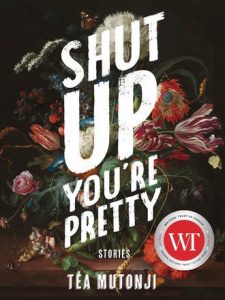 In Tea Mutonji’s disarming debut story collection, a woman contemplates her Congolese traditions during a family wedding, a teenage girl looks for happiness inside a pack of cigarettes, a mother reconnects with her daughter through their shared interest in fish, and a young woman decides to shave her head in the waiting room of an abortion clinic. These punchy, sharply observed stories blur the lines between longing and choosing, exploring the narrator’s experience as an involuntary one. Tinged with pathos and humour, they interrogate the moments in which femininity, womanness, and identity are not only questioned but also imposed. Shut Up You’re Pretty is the first book to be published under the imprint VS. Books, a series of books curated and edited by writer-musician Vivek Shraya featuring work by new and emerging Indigenous or Black writers, or writers of colour.
In Tea Mutonji’s disarming debut story collection, a woman contemplates her Congolese traditions during a family wedding, a teenage girl looks for happiness inside a pack of cigarettes, a mother reconnects with her daughter through their shared interest in fish, and a young woman decides to shave her head in the waiting room of an abortion clinic. These punchy, sharply observed stories blur the lines between longing and choosing, exploring the narrator’s experience as an involuntary one. Tinged with pathos and humour, they interrogate the moments in which femininity, womanness, and identity are not only questioned but also imposed. Shut Up You’re Pretty is the first book to be published under the imprint VS. Books, a series of books curated and edited by writer-musician Vivek Shraya featuring work by new and emerging Indigenous or Black writers, or writers of colour.
The Clothesline Swing
by Ahmad Danny Ramadan (Harbour Publishing)
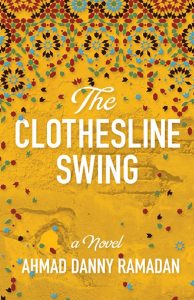 The Clothesline Swing is a journey through the troublesome aftermath of the Arab Spring. A former Syrian refugee himself, Ramadan unveils an enthralling tale of courage that weaves through the mountains of Syria, the valleys of Lebanon, the encircling seas of Turkey, the heat of Egypt and finally, the hope of a new home in Canada. Inspired by One Thousand and One Nights, The Clothesline Swing tells the epic story of two lovers anchored to the memory of a dying Syria. One is a Hakawati, a storyteller, keeping life in forward motion by relaying remembered fables to his dying partner. Each night he weaves stories of his childhood in Damascus, of the cruelty he has endured for his sexuality, of leaving home, of war, of his fated meeting with his lover. Meanwhile Death himself, in his dark cloak, shares the house with the two men, eavesdropping on their secrets as he awaits their final undoing.
The Clothesline Swing is a journey through the troublesome aftermath of the Arab Spring. A former Syrian refugee himself, Ramadan unveils an enthralling tale of courage that weaves through the mountains of Syria, the valleys of Lebanon, the encircling seas of Turkey, the heat of Egypt and finally, the hope of a new home in Canada. Inspired by One Thousand and One Nights, The Clothesline Swing tells the epic story of two lovers anchored to the memory of a dying Syria. One is a Hakawati, a storyteller, keeping life in forward motion by relaying remembered fables to his dying partner. Each night he weaves stories of his childhood in Damascus, of the cruelty he has endured for his sexuality, of leaving home, of war, of his fated meeting with his lover. Meanwhile Death himself, in his dark cloak, shares the house with the two men, eavesdropping on their secrets as he awaits their final undoing.
Frying Plantain
by Zalika Reid-Benta (House of Anansi Press)
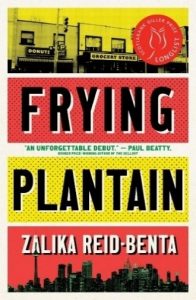 Kara Davis is a girl caught in the middle—of her Canadian nationality and her desire to be a “true” Jamaican, of her mother and grandmother’s rages and life lessons, of having to avoid being thought of as too “faas” or too “quiet” or too “bold” or too “soft.” Set in “Little Jamaica,” Toronto’s Eglinton West neighbourhood, Kara moves from girlhood to the threshold of adulthood, from elementary school to high school graduation, in these twelve interconnected stories. A rich and unforgettable portrait of growing up between worlds, Frying Plantain shows how, in one charged moment, friendship and love can turn to enmity and hate, well-meaning protection can become control, and teasing play can turn to something much darker. In her brilliantly incisive debut, Zalika Reid-Benta artfully depicts the tensions between mothers and daughters, second-generation Canadians and first-generation cultural expectations, and Black identity and predominately white society.
Kara Davis is a girl caught in the middle—of her Canadian nationality and her desire to be a “true” Jamaican, of her mother and grandmother’s rages and life lessons, of having to avoid being thought of as too “faas” or too “quiet” or too “bold” or too “soft.” Set in “Little Jamaica,” Toronto’s Eglinton West neighbourhood, Kara moves from girlhood to the threshold of adulthood, from elementary school to high school graduation, in these twelve interconnected stories. A rich and unforgettable portrait of growing up between worlds, Frying Plantain shows how, in one charged moment, friendship and love can turn to enmity and hate, well-meaning protection can become control, and teasing play can turn to something much darker. In her brilliantly incisive debut, Zalika Reid-Benta artfully depicts the tensions between mothers and daughters, second-generation Canadians and first-generation cultural expectations, and Black identity and predominately white society.
Moon of the Crusted Snow
by Waubgeshig Rice (ECW Press)
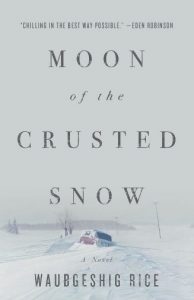 A daring post-apocalyptic novel from a powerful rising literary voice. With winter looming, a small northern Anishinaabe community goes dark. Cut off, people become passive and confused. Panic builds as the food supply dwindles. While the band council and a pocket of community members struggle to maintain order, an unexpected visitor arrives, escaping the crumbling society to the south. Soon after, others follow. The community leadership loses its grip on power as the visitors manipulate the tired and hungry to take control of the reserve. Tensions rise and, as the months pass, so does the death toll due to sickness and despair. Frustrated by the building chaos, a group of young friends and their families turn to the land and Anishinaabe tradition in hopes of helping their community thrive again.
A daring post-apocalyptic novel from a powerful rising literary voice. With winter looming, a small northern Anishinaabe community goes dark. Cut off, people become passive and confused. Panic builds as the food supply dwindles. While the band council and a pocket of community members struggle to maintain order, an unexpected visitor arrives, escaping the crumbling society to the south. Soon after, others follow. The community leadership loses its grip on power as the visitors manipulate the tired and hungry to take control of the reserve. Tensions rise and, as the months pass, so does the death toll due to sickness and despair. Frustrated by the building chaos, a group of young friends and their families turn to the land and Anishinaabe tradition in hopes of helping their community thrive again.
Blending action and allegory, Moon of the Crusted Snow upends our expectations. Out of catastrophe comes resilience. And as one society collapses, another is reborn.
Chasing Painted Horses
by Drew Hayden Taylor (Cormorant Books)
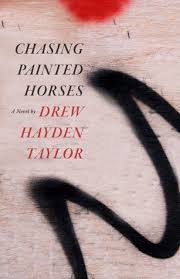 Chasing Painted Horses has a magical, fable-like quality. It is the story of four unlikely friends who live in Otter Lake, a reserve north of Toronto. Ralph and his sister, Shelley, live with their parents. One day, their mother brings home a chalkboard and installs in prominently in the kitchen. She wants her children and their friends to draw something every week, at the end of which there’ll be a vote as to which is the best artwork. Danielle, a small and quiet girl from school, draws a horse—a breathtakingly beautiful horse. And while she wins the competition, the reactions to her work set in motion a series of actions and reactions that will shape the lives of the brother and sister and William, Shelley’s would-be-boyfriend, that rarity, a bully who bullies other bullies.
Chasing Painted Horses has a magical, fable-like quality. It is the story of four unlikely friends who live in Otter Lake, a reserve north of Toronto. Ralph and his sister, Shelley, live with their parents. One day, their mother brings home a chalkboard and installs in prominently in the kitchen. She wants her children and their friends to draw something every week, at the end of which there’ll be a vote as to which is the best artwork. Danielle, a small and quiet girl from school, draws a horse—a breathtakingly beautiful horse. And while she wins the competition, the reactions to her work set in motion a series of actions and reactions that will shape the lives of the brother and sister and William, Shelley’s would-be-boyfriend, that rarity, a bully who bullies other bullies.
Jonny Appleseed
by Joshua Whitehead (Arsenal Pulp Press)
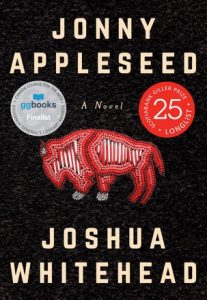 A tour-de-force debut novel about a Two-Spirit Indigiqueer young man and proud NDN glitter princess who must reckon with his past when he returns home to his reserve. “You’re gonna need a rock and a whole lotta medicine” is a mantra that Jonny Appleseed, a young Two-Spirit/Indigiqueer, repeats to himself in this vivid and utterly compelling debut novel by poet Joshua Whitehead. Off the reserve and trying to find ways to live and love in the big city, Jonny becomes a cybersex worker who fetishizes himself in order to make a living. Jonny has one week before he must return to the “rez”—and his former life—to attend the funeral of his stepfather. The seven days that follow are like a fevered dream: stories of love, trauma, sex, kinship, ambition, and the heartbreaking recollection of his beloved kokum (grandmother). Jonny’s life is a series of breakages, appendages, and linkages—and as he goes through the motions of preparing to return home, he learns how to put together the pieces of his life.
A tour-de-force debut novel about a Two-Spirit Indigiqueer young man and proud NDN glitter princess who must reckon with his past when he returns home to his reserve. “You’re gonna need a rock and a whole lotta medicine” is a mantra that Jonny Appleseed, a young Two-Spirit/Indigiqueer, repeats to himself in this vivid and utterly compelling debut novel by poet Joshua Whitehead. Off the reserve and trying to find ways to live and love in the big city, Jonny becomes a cybersex worker who fetishizes himself in order to make a living. Jonny has one week before he must return to the “rez”—and his former life—to attend the funeral of his stepfather. The seven days that follow are like a fevered dream: stories of love, trauma, sex, kinship, ambition, and the heartbreaking recollection of his beloved kokum (grandmother). Jonny’s life is a series of breakages, appendages, and linkages—and as he goes through the motions of preparing to return home, he learns how to put together the pieces of his life.
Reproduction
by Ian Williams (Penguin Random House Canada)
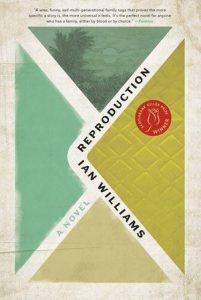 A hilarious, surprising and poignant love story about the way families are invented, told with the savvy of a Zadie Smith and with an inventiveness all Ian Williams’ own, Reproduction explores unconventional connections and brilliantly redefines family. Felicia and Edgar meet as their mothers are dying. Felicia, a teen from an island nation, and Edgar, the lazy heir of a wealthy German family, come together only because their mothers share a hospital room. When Felicia’s mother dies and Edgar’s “Mutter” does not, Felicia drops out of high school and takes a job as Mutter’s caregiver. While Felicia and Edgar don’t quite understand each other, and Felicia recognizes that Edgar is selfish, arrogant, and often unkind, they form a bond built on grief (and proximity) that results in the birth of a son Felicia calls Armistice. Or Army, for short. Some years later, Felicia and Army (now 14) are living in the basement of a home owned by Oliver, a divorced man of Portuguese descent who has two kids—the teenaged Heather and the odd little Hendrix. Along with Felicia and Army, they form an unconventional family, except that Army wants to sleep with Heather, and Oliver wants to kill Army. Reproduction is a profoundly insightful exploration of the bizarre ways people become bonded that insists that family isn’t a matter of blood.
A hilarious, surprising and poignant love story about the way families are invented, told with the savvy of a Zadie Smith and with an inventiveness all Ian Williams’ own, Reproduction explores unconventional connections and brilliantly redefines family. Felicia and Edgar meet as their mothers are dying. Felicia, a teen from an island nation, and Edgar, the lazy heir of a wealthy German family, come together only because their mothers share a hospital room. When Felicia’s mother dies and Edgar’s “Mutter” does not, Felicia drops out of high school and takes a job as Mutter’s caregiver. While Felicia and Edgar don’t quite understand each other, and Felicia recognizes that Edgar is selfish, arrogant, and often unkind, they form a bond built on grief (and proximity) that results in the birth of a son Felicia calls Armistice. Or Army, for short. Some years later, Felicia and Army (now 14) are living in the basement of a home owned by Oliver, a divorced man of Portuguese descent who has two kids—the teenaged Heather and the odd little Hendrix. Along with Felicia and Army, they form an unconventional family, except that Army wants to sleep with Heather, and Oliver wants to kill Army. Reproduction is a profoundly insightful exploration of the bizarre ways people become bonded that insists that family isn’t a matter of blood.
This Place: 150 Years
(HighWater Press)
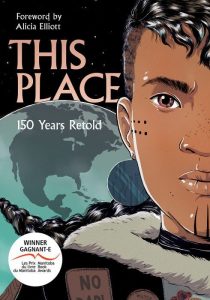 Explore the past 150 years through the eyes of Indigenous creators in this groundbreaking graphic novel anthology. Beautifully illustrated, these stories are an emotional and enlightening journey through Indigenous wonderworks, psychic battles, and time travel. See how Indigenous peoples have survived a post-apocalyptic world since Contact.
Explore the past 150 years through the eyes of Indigenous creators in this groundbreaking graphic novel anthology. Beautifully illustrated, these stories are an emotional and enlightening journey through Indigenous wonderworks, psychic battles, and time travel. See how Indigenous peoples have survived a post-apocalyptic world since Contact.
Retold by Kateri Akiwenzie-Damm, Sonny Assu, Brandon Mitchell, Rachel and Sean Qitsualik-Tinsley, David A. Robertson, Niigaanwewidam James Sinclair, Jen Storm, Richard Van Camp, Katherena Vermette and Chelsea Vowel.
Illustrated by Tara Audibert, Kyle Charles, GMB Chomichuk, Natasha Donovan, Scott B. Henderson, Ryan Howe, Andrew Lodwick and Jen Storm.
Colour by Scott A. Ford and Donovan Yaciuk.
POETRY
NDN Coping Mechanisms: Notes from the Field
by Billy-Ray Belcourt (House of Anansi Press)
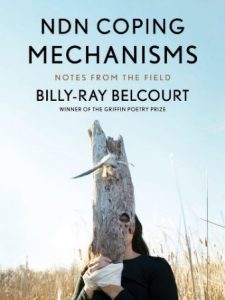 In the follow-up to his Griffin Poetry Prize-winning collection, This Wound is a World, Billy-Ray Belcourt writes using the modes of accusation and interrogation. He aims an anthropological eye at the realities of everyday life to show how they house the violence that continues to reverberate from the long twentieth century. In a genre-bending constellation of poetry, photography, redaction, and poetics, Belcourt ultimately argues that if signifiers of Indigenous suffering are everywhere, so too is evidence of Indigenous peoples’ rogue possibility, their utopian drive.
In the follow-up to his Griffin Poetry Prize-winning collection, This Wound is a World, Billy-Ray Belcourt writes using the modes of accusation and interrogation. He aims an anthropological eye at the realities of everyday life to show how they house the violence that continues to reverberate from the long twentieth century. In a genre-bending constellation of poetry, photography, redaction, and poetics, Belcourt ultimately argues that if signifiers of Indigenous suffering are everywhere, so too is evidence of Indigenous peoples’ rogue possibility, their utopian drive.
day/break
by Gwen Benaway (Book*hug Press)
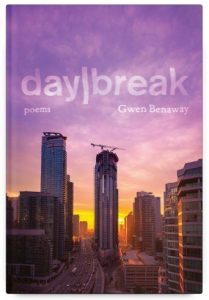 day/break, poet Gwen Benaway’s fourth collection of work, explores the everyday poetics of the trans feminine body. Through intimate experiences and conceptualizations of trans life, day/break asks what it means to be a trans woman, both within the text and out in the physical world. Shifting between theory and poetry, Benaway questions how gender, sexuality, and love intersect with the violence and transmisogyny of the nation state and established literary institutions. In beautiful lyric verse, day/break reveals the often-unseen other worlds of trans life, where body, self, and sex are transformed, becoming more than fixed binary locations.
day/break, poet Gwen Benaway’s fourth collection of work, explores the everyday poetics of the trans feminine body. Through intimate experiences and conceptualizations of trans life, day/break asks what it means to be a trans woman, both within the text and out in the physical world. Shifting between theory and poetry, Benaway questions how gender, sexuality, and love intersect with the violence and transmisogyny of the nation state and established literary institutions. In beautiful lyric verse, day/break reveals the often-unseen other worlds of trans life, where body, self, and sex are transformed, becoming more than fixed binary locations.
Hope Matters
by Columpa Bobb, Tania Carter and Lee Maracle (Book*hug Press)
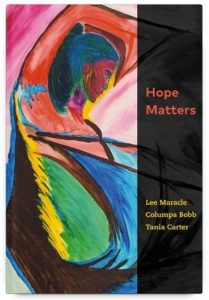 Throughout their youth, Columpa Bobb and Tania Carter wrote poetry with their mother, award-winning author Lee Maracle. The three always dreamed that one day they would write a book together. This book is the result of that dream.
Throughout their youth, Columpa Bobb and Tania Carter wrote poetry with their mother, award-winning author Lee Maracle. The three always dreamed that one day they would write a book together. This book is the result of that dream.
The wide-ranging poems in Hope Matters focus on the journey of Indigenous peoples from colonial beginnings to reconciliation. But they also document a very personal journey—that of a mother and her two daughters.
Written collaboratively, Hope Matters offers a blend of three distinct and exciting voices that come together in a shared song of hope and reconciliation.
Land to Light On
by Dionne Brand (McClelland & Stewart)
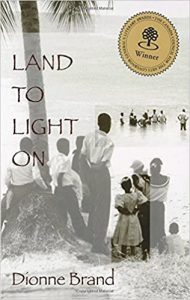 Land to Light On opens onto the landscape of Canada. “Out here I am…not even safe as the sea,” she writes. “If I am peaceful…is not peace,/is getting used to harm.” Brand writes about a place where she is an outsider – as any poet or painter must be—and also about the many outsiders who have come here and settled over the years, uncomfortable with the land and its people, uncomfortable sometimes with themselves. No one writes about this country like Brand, free of post-colonial cant yet selvedged with Black suffering in the Americas. Speaking of memory but without a longing for the past, these poems hover between story and song; between groundings of life, wherever your landfall, and the grace of love and light. They ring with a poet’s hesitations, a woman’s praise and prayer for her people and their place. “It always takes long to come to what you have to say, you have to/sweep this stretch of land up around your feet and point to the/signs, pleat whole histories with pins in your mouth and guess/at the fall of words.”
Land to Light On opens onto the landscape of Canada. “Out here I am…not even safe as the sea,” she writes. “If I am peaceful…is not peace,/is getting used to harm.” Brand writes about a place where she is an outsider – as any poet or painter must be—and also about the many outsiders who have come here and settled over the years, uncomfortable with the land and its people, uncomfortable sometimes with themselves. No one writes about this country like Brand, free of post-colonial cant yet selvedged with Black suffering in the Americas. Speaking of memory but without a longing for the past, these poems hover between story and song; between groundings of life, wherever your landfall, and the grace of love and light. They ring with a poet’s hesitations, a woman’s praise and prayer for her people and their place. “It always takes long to come to what you have to say, you have to/sweep this stretch of land up around your feet and point to the/signs, pleat whole histories with pins in your mouth and guess/at the fall of words.”
The Gospel of Breaking
by Jillian Christmas (Arsenal Pulp Press)
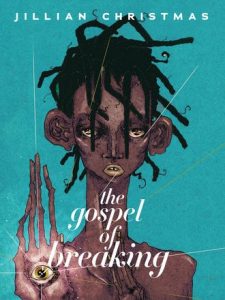 In The Gospel of Breaking, Jillian Christmas confirms what followers of her performance and artistic curation have long known: there is magic in her words. Befitting someone who “speaks things into being,” Christmas extracts from family history, queer lineage, and the political landscape of a racialized life to create a rich, softly defiant collection of poems.
In The Gospel of Breaking, Jillian Christmas confirms what followers of her performance and artistic curation have long known: there is magic in her words. Befitting someone who “speaks things into being,” Christmas extracts from family history, queer lineage, and the political landscape of a racialized life to create a rich, softly defiant collection of poems.
Christmas draws a circle around the things she calls “holy”: the family line that cannot find its root but survived to fill the skies with radiant flesh; the body, broken and unbroken and broken and new again; the lover lost, the friend lost, and the loss itself; and the hands that hold them all with brilliant, tender care. Expansive and beautiful, these poems allow readers to swim in Jillian Christmas’s mother-tongue and to dream at her shores.
on/me
by Francine Cunningham (Caitlin Press)
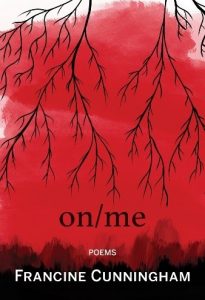 Francine Cunningham lives with constant reminders that she doesn’t fit the desired expectations of the world: she is a white-passing, city-raised Indigenous woman with mental illness who has lost her mother. In her debut poetry collection on/me, Cunningham explores, with keen attention and poise, what it means to be forced to exist within the margins. Cunningham does not hold back: she holds a lens to residential schools, intergenerational trauma, Indigenous Peoples forcibly sent to sanatoriums, systemic racism and mental illness, and translates these topics into lived experiences that are nuanced, emotional, funny and heartbreaking all at once. on/me is an encyclopedia of Cunningham, who shares some of her most sacred moments with the hope to spark a conversation that needs to be had.
Francine Cunningham lives with constant reminders that she doesn’t fit the desired expectations of the world: she is a white-passing, city-raised Indigenous woman with mental illness who has lost her mother. In her debut poetry collection on/me, Cunningham explores, with keen attention and poise, what it means to be forced to exist within the margins. Cunningham does not hold back: she holds a lens to residential schools, intergenerational trauma, Indigenous Peoples forcibly sent to sanatoriums, systemic racism and mental illness, and translates these topics into lived experiences that are nuanced, emotional, funny and heartbreaking all at once. on/me is an encyclopedia of Cunningham, who shares some of her most sacred moments with the hope to spark a conversation that needs to be had.
Execution Poems
by George Elliott Clarke (Gaspereau Press)
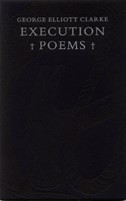 Originally released in 2000 in a limited edition of 66 books handset and printed letterpress in a folio format, Execution Poems has gone on to sell over 6,000 copies. It was the winner of the 2001 Governor General’s award for poetry and took first place in the poetry category of the 2001 Alcuin Awards for Excellence in Canadian Book Design. Execution Poems is a suite of poems about Clarke’s cousins, George and Rufus Hamilton, who were hanged in July 1949 for the murder of a Fredericton, New Brunswick, taxi driver. In this startling work, Clarke reminds us of racism and poverty and of their brutal, tragic results, blurring the line between the perpetrator and the victim—a line we’d prefer to be simple and clear. As all true poetry should, Clarke’s embodies both damnation and redemption, offering convoluted triumphs alongside tragedy.
Originally released in 2000 in a limited edition of 66 books handset and printed letterpress in a folio format, Execution Poems has gone on to sell over 6,000 copies. It was the winner of the 2001 Governor General’s award for poetry and took first place in the poetry category of the 2001 Alcuin Awards for Excellence in Canadian Book Design. Execution Poems is a suite of poems about Clarke’s cousins, George and Rufus Hamilton, who were hanged in July 1949 for the murder of a Fredericton, New Brunswick, taxi driver. In this startling work, Clarke reminds us of racism and poverty and of their brutal, tragic results, blurring the line between the perpetrator and the victim—a line we’d prefer to be simple and clear. As all true poetry should, Clarke’s embodies both damnation and redemption, offering convoluted triumphs alongside tragedy.
How She Read
by Chantal Gibson (Caitlin Press)
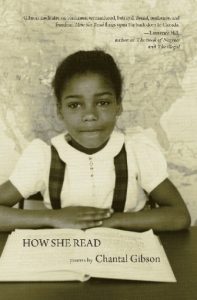 How She Read is a collection of genre-blurring poems about the representation of Black women, their hearts, minds and bodies, across the Canadian cultural imagination.
How She Read is a collection of genre-blurring poems about the representation of Black women, their hearts, minds and bodies, across the Canadian cultural imagination.
Drawing from grade-school vocabulary spellers, literature, history, art, media and pop culture, Chantal Gibson’s sassy semiotics highlight the depth and duration of the imperialist ideas embedded in everyday things, from storybooks to coloured pencils, from paintings to postage stamps.
A mediation on motherhood and daughterhood, belonging, loss and recovery, the collection weaves the voices of Black women, past and present. As Gibson dismantles the grammar of her Queen Elizabeth English, sister scholars talk back, whisper, suck teeth, curse and carry on from canonized texts, photographs and art gallery walls, reinterpreting their image, re-reading their bodies and claiming their space in a white, hegemonic landscape.
I have to live
by Aisha Sasha John (McClelland & Stewart)
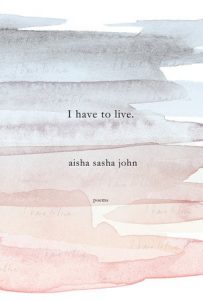 A new collection ablaze with urgency and radiant inquiry from a 2015 finalist for the Trillium Book Award for Poetry.
A new collection ablaze with urgency and radiant inquiry from a 2015 finalist for the Trillium Book Award for Poetry.
A demand and promise; an obligation and challenge; a protest and call: I have to live.
Juiced on the ecstasy of self-belief: I have to live.
A burgeoning erotics of psychic boldness: I have to live.
In which sensitivity is recognized as wealth: I have to live.
Trumpeting the forensic authority of the heart: I have to live.
This is original ancient poetry. It fashions a universe from its mouth.
Magnetic Equator
by Kaie Kellough (McClelland & Stewart)
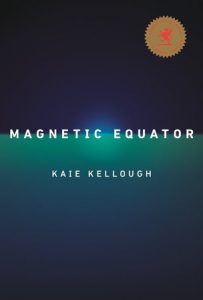 An original, inventive—and visually stunning—exploration of place, identity, language, and experience from the acclaimed poet, novelist, and sound performer.
An original, inventive—and visually stunning—exploration of place, identity, language, and experience from the acclaimed poet, novelist, and sound performer.
The poems in Kaie Kellough’s third collection drift between South and North America. They seek their ancestry in Georgetown, Guyana, in the Amazon Rainforest, and in the Atlantic Ocean. They haunt the Canadian Prairie. They recall the 1980s in the suburbs of Calgary, and they reflect on the snowed-in, bricked-in boroughs of post-referendum Montréal. They puzzle their language together from the natural world and from the works of Caribbean and Canadian writers. They reassemble passages about seed catalogues, about origins, about finding a way in the world, about black ships sailing across to land. They struggle to explain a state of being hemisphered, of being present here while carrying a heartbeat from elsewhere, and they map the distances travelled.
77 Fragments of a Familiar Ruin
by Thomas King (HarperCollins Canada)
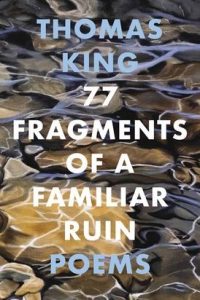 Timely, important, mischievous, powerful: in a word, exceptional. Seventy-seven poems intended as a eulogy for what we have squandered, a reprimand for all we have allowed, a suggestion for what might still be salvaged, a poetic quarrel with our intolerant and greedy selves, a reflection on mortality and longing, as well as a long-running conversation with the mythological currents that flow throughout North America.
Timely, important, mischievous, powerful: in a word, exceptional. Seventy-seven poems intended as a eulogy for what we have squandered, a reprimand for all we have allowed, a suggestion for what might still be salvaged, a poetic quarrel with our intolerant and greedy selves, a reflection on mortality and longing, as well as a long-running conversation with the mythological currents that flow throughout North America.
Sonnet’s Shakespeare
by Sonnet L’Abbe (McClelland & Stewart)
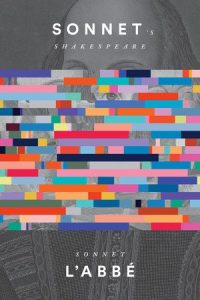 Bronwen Wallace Memorial Award-winning poet Sonnet L’Abbé returns with her third collection, in which a mixed-race woman decomposes her inheritance of Shakespeare by breaking open the sonnet and inventing an entirely new poetic form. How can poetry grapple with how some cultures assume the place of others?
Bronwen Wallace Memorial Award-winning poet Sonnet L’Abbé returns with her third collection, in which a mixed-race woman decomposes her inheritance of Shakespeare by breaking open the sonnet and inventing an entirely new poetic form. How can poetry grapple with how some cultures assume the place of others?
How can English-speaking writers use the English language to challenge the legacy of colonial literary values? In Sonnet’s Shakespeare, one young, half-dougla (mixed South Asian and Black) poet tries to use “the master’s tools” on the Bard’s “house,” attempting to dismantle his monumental place in her pysche and in the poetic canon.
This is an artist’s magnum opus and mixed-race girlboy’s diary; the voice of a settler on stolen Indigenous territories, a sexual assault survivor, a lover of Sylvia Plath and Public Enemy. Touching on such themes as gender identity, pop music, nationhood, video games, and the search for interracial love, this book is a poetic achievement of undeniable scope and significance.
Voodoo Hypothesis
by Canisia Lubrin (Wolsak & Wynn)
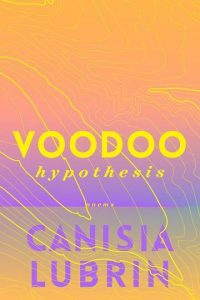 Voodoo Hypothesis is a subversion of the imperial construct of “blackness” and a rejection of the contemporary and historical systems that paint black people as inferior, through constant parallel representations of “evil” and “savagery.” Pulling from pop culture, science, pseudo-science and contemporary news stories about race, asks: What happens if the systems of belief that give science, religion and culture their importance were actually applied to the contemporary “black experience”? With its irreverence toward colonialism, and the related obsession with post-colonialism and anti-colonialism, and her wide-ranging lines, deftly touched with an intermingling of Caribbean Creole, English patois and baroque language, Lubrin has created a book that holds up a torch to the narratives of the ruling class, and shows us the restorative possibilities that exist in language itself.
Voodoo Hypothesis is a subversion of the imperial construct of “blackness” and a rejection of the contemporary and historical systems that paint black people as inferior, through constant parallel representations of “evil” and “savagery.” Pulling from pop culture, science, pseudo-science and contemporary news stories about race, asks: What happens if the systems of belief that give science, religion and culture their importance were actually applied to the contemporary “black experience”? With its irreverence toward colonialism, and the related obsession with post-colonialism and anti-colonialism, and her wide-ranging lines, deftly touched with an intermingling of Caribbean Creole, English patois and baroque language, Lubrin has created a book that holds up a torch to the narratives of the ruling class, and shows us the restorative possibilities that exist in language itself.
Field Notes for the Self
by Randy Lundy (University of Regina Press)
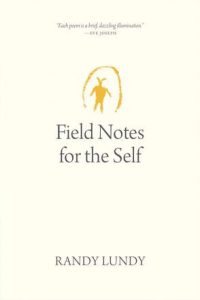 Field Notes for the Self is a series of dark meditations: spiritual exercises in which the poem becomes a forensics of the soul. The poems converse with Patrick Lane, John Thompson, and Charles Wright, but their closest cousins may be Arvo Pärt’s tintinnabulations—overlapping structures in which notes or images are rung slowly and repeatedly like bells. The goal is freedom from illusion, freedom from memory, from “the same old stories” of Lundy’s violent past; and freedom, too, from the unreachable memories of the violence done to his Indigenous ancestors, which, Lundy tells us, seem to haunt his cellular biology. Rooted in exquisitely modulated observations of the natural world, the singular achievement of these poems is mind itself, suspended before interior vision like a bit of crystal twisting in the light.
Field Notes for the Self is a series of dark meditations: spiritual exercises in which the poem becomes a forensics of the soul. The poems converse with Patrick Lane, John Thompson, and Charles Wright, but their closest cousins may be Arvo Pärt’s tintinnabulations—overlapping structures in which notes or images are rung slowly and repeatedly like bells. The goal is freedom from illusion, freedom from memory, from “the same old stories” of Lundy’s violent past; and freedom, too, from the unreachable memories of the violence done to his Indigenous ancestors, which, Lundy tells us, seem to haunt his cellular biology. Rooted in exquisitely modulated observations of the natural world, the singular achievement of these poems is mind itself, suspended before interior vision like a bit of crystal twisting in the light.
Bones
by Tyler Pennock (Brick Books)
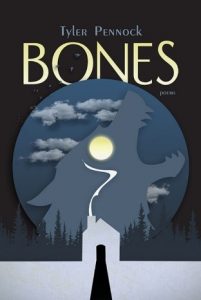 Bones, Tyler Pennock’s wise and arresting debut, is about the ways we process the traumas of our past, and about how often these experiences eliminate moments of softness and gentleness. Here, poems journey inward, guided by the world of dreams, seeking memories of a loving sister lost beneath layers of tragedy and abuse. With bravery, these poems stand up to the demons lurking in the many shadows of their lines, seeking glimpses of a good that is always just out of reach. At moments heart-rending and gut-punching, at others still and sweet, Bones is a collection of deep and painstaking work that examines the human spirit in all of us. This is a hero’s journey and a stark look at the many conditions of the soul. This is a book for survivors, for fighters, for dreamers, and for believers.
Bones, Tyler Pennock’s wise and arresting debut, is about the ways we process the traumas of our past, and about how often these experiences eliminate moments of softness and gentleness. Here, poems journey inward, guided by the world of dreams, seeking memories of a loving sister lost beneath layers of tragedy and abuse. With bravery, these poems stand up to the demons lurking in the many shadows of their lines, seeking glimpses of a good that is always just out of reach. At moments heart-rending and gut-punching, at others still and sweet, Bones is a collection of deep and painstaking work that examines the human spirit in all of us. This is a hero’s journey and a stark look at the many conditions of the soul. This is a book for survivors, for fighters, for dreamers, and for believers.
BOOKS FOR CHILDREN AND TEENS
I Have the Right to Be a Child by Alain Serres, Illustrated by Aurélia Fronty and Translated by Helen Mixter (Groundwood Books)
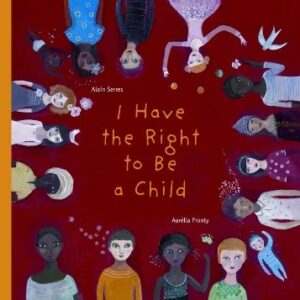 For students in grades P–2
For students in grades P–2
With a very simple text accompanied by rich, vibrant illustrations a young narrator describes what it means to be a child with rights—from the right to food, water and shelter, to the right to go to school, to be free from violence, to breathe clean air, and more. The book emphasizes that these rights belong to every child on the planet, whether they are “black or white, small or big, rich or poor, born here or somewhere else.” It also makes evident that knowing and talking about these rights are the first steps toward making sure that they are respected.
Happy in Our Skin
by Fran Manushkin and Illustrated by Lauren Tobia (Candlewick Press)
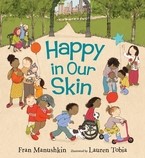 Ages 4–6
Ages 4–6
Just savor these bouquets of babies—cocoa-brown, cinnamon, peaches and cream. As they grow, their clever skin does too, enjoying hugs and tickles, protecting them inside and out, and making them one of a kind. Fran Manushkin’s rollicking text and Lauren Tobia’s delicious illustrations paint a breezy and irresistible picture of the human family—and how wonderful it is to be just who you are. Is there anything more splendid than a baby’s skin? For families of all stripes comes a sweet celebration of what makes us unique—and what holds us together.
The Stone Thrower,
by Jael Ealey Richardson and illustrated by Matt James
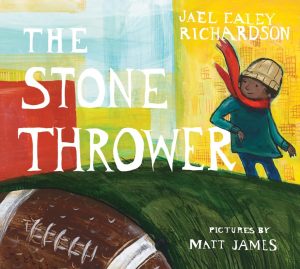 Ages: 5–9
Ages: 5–9
The African-American football player Chuck Ealey grew up in a segregated neighborhood of Portsmouth, Ohio. Against all odds, he became an incredible quarterback. But despite his unbeaten record in high school and university, he would never play professional football in the United States.
Chuck Ealey grew up poor in a racially segregated community that was divided from the rest of town by a set of train tracks, but his mother assured him that he wouldn’t stay in Portsmouth forever. Education was the way out, and a football scholarship was the way to pay for that education. So despite the racist taunts he faced at all the games he played in high school, Chuck maintained a remarkable level of dedication and determination. And when discrimination followed him to university and beyond, Chuck Ealey remained undefeated.
This inspirational story is told by Chuck Ealey’s daughter, author and educator Jael Richardson, with striking and powerful illustrations by award-winning illustrator Matt James.
Cold White Sun
by Sue Farrell Holler (Groundwood Books)
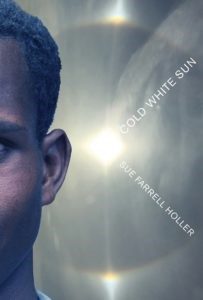 Ages 14+
Ages 14+
A teenage boy stands outside the Calgary bus station, alone, on a frigid night. He has no winter clothes, no identification, and he speaks little English. His name is Tesfaye, but who is he, and where did he come from? Tesfaye’s story is true, told by Alberta writer Sue Farrell Holler after hundreds of hours of research and interviews with the real “Tesfaye,” who cannot be identified so as to protect his family. Cold White Sun has the full support and endorsement of “Tesfaye,” and he has provided a statement that serves as the novel’s frontispiece: “When the author and I began work on this story, I was hurt, confused, and didn’t understand what had happened to me or why. I was angry, but I didn’t know why I was angry and I didn’t know where to direct it — my country, my family, the set of circumstances that caused me to flee Ethiopia, or a combination of all three. My underlying anxiety was senseless but I couldn’t let it go. Sharing my story and watching it develop as a work of fiction helped me see my past in a different context. is perspective has changed my heart and my mind and brought me peace.”
Squawk
by Megan Gail Coles (Playwrights Canada Press)
Ages 15–18
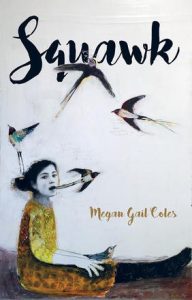 Annie Runningbird doesn’t have time for the games boys want her to play. She’s aging out of foster care on her next birthday. The system has decided she is an adult, so Annie must make adult decisions. Where will she live? How will she make money? Demanding grown-up choices preoccupy the young girl’s mind as she navigates relationships with boys and men in her company. Does she like Isaac, a cute yet naive boy she met at the mall food court? Can she trust Louis, her older and increasingly overbearing foster care worker? Who can Annie depend on in her ever-shifting world? This intel is important. Because Annie needs to win the very real game she’s playing. She must save herself to save the day.
Annie Runningbird doesn’t have time for the games boys want her to play. She’s aging out of foster care on her next birthday. The system has decided she is an adult, so Annie must make adult decisions. Where will she live? How will she make money? Demanding grown-up choices preoccupy the young girl’s mind as she navigates relationships with boys and men in her company. Does she like Isaac, a cute yet naive boy she met at the mall food court? Can she trust Louis, her older and increasingly overbearing foster care worker? Who can Annie depend on in her ever-shifting world? This intel is important. Because Annie needs to win the very real game she’s playing. She must save herself to save the day.
The Marrow Thieves
by Cherie Dimaline (DCB Books, an imprint of Cormorant Books)
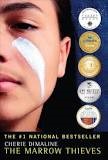 Ages 13+
Ages 13+
Humanity has nearly destroyed its world through global warming, but now an even greater evil lurks. The indigenous people of North America are being hunted and harvested for their bone marrow, which carries the key to recovering something the rest of the population has lost: the ability to dream. In this dark world, Frenchie and his companions struggle to survive as they make their way up north to the old lands. For now, survival means staying hidden—but what they don’t know is that one of them holds the secret to defeating the marrow thieves.
The Missing<
by Melanie Florence (James Lorimer)
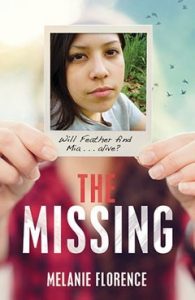 Ages 13 – 18
Ages 13 – 18
After a girl she knows from school goes missing and is found dead in the Red River, Feather is shocked when the police write it off as a suicide. Then, it’s Feather’s best friend, Mia, who vanishes but Mia’s mom and abusive stepfather paint Mia as a frequent runaway, so the authorities won’t investigate her disappearance either. Everyone knows that Native girls are disappearing and being killed, but no one is connecting the dots. When Feather’s brother Kiowa is arrested under suspicion of Mia’s abduction, Feather knows she has to clear his name. What Feather doesn’t know is that the young serial killer who has taken Mia has become obsessed with Feather, and her investigation is leading her into terrible danger. Using as its background the ongoing circumstance of unsolved cases of missing and murdered Aboriginal women, this fictional thriller set in Winnipeg explores one teenager’s response to a system that has long denied and misrepresented the problem.
If I Go Missing
by Brianna Jonnie with Nahanni Shingoose, and art by Nshannacappo (James Lorimer)
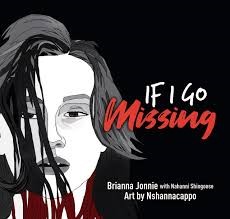 Ages 12–18
Ages 12–18
Combining graphic fiction and non-fiction, this young adult graphic novel serves as a window into one of the unique dangers of being an Indigenous teen in Canada today. The text of the book is derived from excerpts of a letter written to the Winnipeg Chief of Police by fourteen-year-old Brianna Jonnie—a letter that went viral and was also the basis of a documentary film. In her letter, Jonnie calls out the authorities for neglecting to immediately investigate missing Indigenous people and urges them to “not treat me as the Indigenous person I am proud to be,” if she were to be reported missing.
Indigenous artist Neal Shannacappo provides the artwork for the book. Through his illustrations he imagines a situation in which a young Indigenous woman does disappear, portraying the reaction of her community, her friends, the police and media.
Betty: The Helen Betty Osborne Story
by David A Robertson and Illustrated by Scott B. Henderson (HighWater Press)
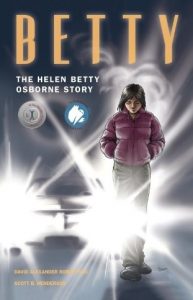 Ages 14+
Ages 14+
Helen Betty Osborne, known as Betty to her closest friends and family, dreamed of becoming a teacher. She left her home to attend residential school and high school in a small town in Manitoba. On November 13, 1971, Betty was abducted and brutally murdered by four young men. Initially met with silence and indifference, her tragic murder resonates loudly today. Betty represents one of almost 1,200 Indigenous women in Canada who have been murdered or gone missing.
Note: Given the sensitive nature of the content in Betty, it may not be suitable for all readers. It is recommended that Betty: The Helen Betty Osborne Story should be considered for students in Grade 9 or above.
Africville: An African Nova Scotian Community Is Demolished—and Fights Back
by Gloria Ann Wesley (James Lorimer)
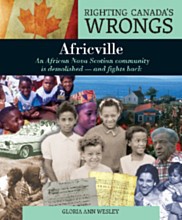 Ages 13–18
Ages 13–18
The community of Africville was founded in the late 1800s when African Nova Scotians built homes on the Bedford Basin on the northern edge of Halifax. At its peak, about 400 people lived there. In the 1960s, in the name of urban renewal, the City of Halifax decided to demolish Africville, relocate its residents and use the land for industrial development. Residents strongly opposed this move, but their homes were bulldozed, and many had to move into public housing projects in other parts of the city. After years of pressure from former members of the community and their descendants, the City of Halifax finally apologized for the destruction of Africville and offered some compensation. Through historical photographs, documents, and first-person narratives, this book tells the story of Africville. It documents how the city destroyed Africville and much later apologized for it—and how the spirit of the community lives on.
I’m Gonna Push Through!
by Jasmyn Wright and Illustrated by Shannon Wright (Simon & Schuster Canada)
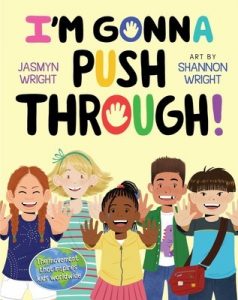
Ages 4-8
Based on the Push Through movement that inspires kids worldwide, this is an empowering, energetic, and all-inclusive picture book that celebrates resilience in the face of adversity. Hold your head high. No matter what stands in the way of your dreams, remember this: YOU can push through anything! If someone tells you it’s too hard, don’t you ever listen. You tell them, “I’m gonna push through!”
Inspired by a mantra written for her third-grade students, Jasmyn Wright’s uplifting call to “push through” is an invitation to young readers to announce their own power and to recognize and reaffirm that of others, regardless of setbacks. Her empowering words not only lift children up, but show them how to lift themselves up and seize their potential.
ARTICLES
Read news articles exploring racism in Canada
“Cogs in the colonial wheel: Why racism in Canada’s police force is as old as policing” by Olivia Bowden, Global News
“From taking a knee to taking a stand: Why anti-Black racism in Canada can’t be ignored” by Morganne Campbell, Global News
“Commentary: Yes, there is systemic racism in Canada—our history is filled with it” by Meera Estrada, Special to Global News
“Indigenous families say deaths of their loved ones in police custody part of pattern” by Amy Smart, The Canadian Press
“We’re sick and tired of it: Members of Toronto neighbourhood share stories of anti-Black racism” by Kamil Karamali, Global News
“Canada’s Hidden Racism” by Brittany Garuk, Current
“Canadian cultural institutions have silenced Black voices for years. Can we write a new chapter?” by Amanda Parris, CBC Arts
“Refused service, looked over for a job, profiled in a store: Black Manitobans recount experiences of racism” by Austin Grabish, CBC News
“Don’t Believe the Hype: Canada is Not a Nation of Cultural Tolerance” by Charles Officer, CBC Gem
“Yes Canada, we too have an anti-Black racism problem” by Michael Adams and Marva Wisdom, The Globe and Mail
“Grown-ups Aren’t Letting Black Girls Be Kids, And It’s Harming Them” by Natalie Stechyson, Huffpost
“Racism Kept Thunder Bay Police From Fully Investigating Indigenous Deaths, Says Police Watchdog In Scathing Report” by Samantha Beattie, Huffpost
“Students In Canada Get Behind The #BlackOnCampus Movement” by Angelyn Francis, Huffpost
“In their words: Canadians’ experiences of racism” by Brooklyn Neustaeter, CTV News
Read news articles from diverse authors all over the world
“The Death of George Floyd, In Context” by Jelani Cobb, The New Yorker
“Of Course There Are Protests. The State Is Failing Black People.” by Keeanga-Yamahtta Taylor, The New York Times
“This Is How Loved Ones Want Us To Remember George Floyd” by Alisha Ebrahimji, CNN
“Our democracy’s founding ideals were false when they were written. Black Americans have fought to make them true.” by Nikole Hannah-Jones, The New York Times Magazine
“You shouldn’t need a Harvard degree to survive birdwatching while black” by Samuel Getachew, The Washington Post
“The Case for Reparations” by Ta-Nehisi Coates, The Atlantic
“How to Make This Moment the Turning Point for Real Change” by Barack Obama, Medium
“Black Male Writers For Our Time” by Ayana Mathis, The New York Times Style Magazine
“I Was The Mayor Of Minneapolis And I Know Our Cops Have A Problem” by R.T. Rybak, Politico
“Don’t understand the protests? What you’re seeing is people pushed to the edge.” by Kareem Abdul-Jabbar, Los Angeles Times
“I’m Black. My Mom is White. This Is The Talk We Had To Have About George Floyd’s Killing.” by Kimberly J. Miller, Huffington Post
“France: What happened to Adama Traoré?” by Pauline Bock, euronews
“Protests Support Floyd, Black Lives Matter On 3 Continents” by Associated Press
“George Floyd Could Have Been My Brother” by Rita Omokha, Elle
“Building resilience in a racist world” by Louisa Adjoa Parker and artwork by Olivia Twist, Wellcome Collection
“Capturing the Black Lives Matter Movement” by Alex Begin, unsplash.com

